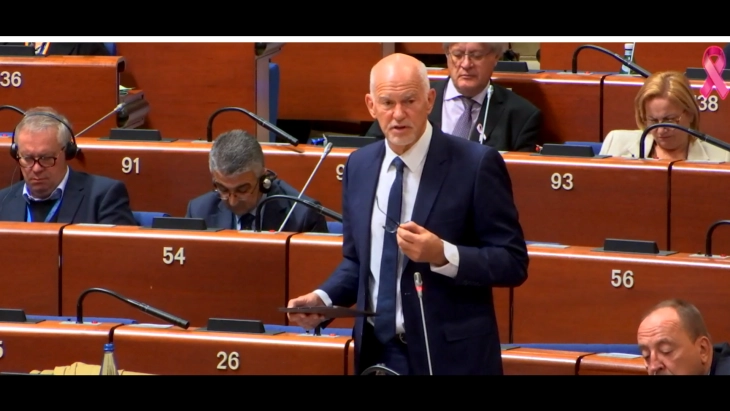PACE calls for new impetus to EU enlargement with Western Balkan countries

Strasbourg, 11 October 2022 (MIA) - The Parliamentary Assembly of the Council of Europe (PACE) in its resolutions passed Tuesday called on the European Union to give new impetus to the enlargement process to the Western Balkans, all the while urging the region without delay to address outstanding challenges, reports MIA's Strasbourg correspondent.
The European vision had lost its shine, giving way to ethno-nationalism, and an increasing number of people in the Western Balkans, especially the youth, now believe their countries will never join the European Union, according to the PACE conclusions.
"The Parliamentary Assembly, therefore, firmly believes that helping Albania, Bosnia and Herzegovina, Montenegro, North Macedonia, Serbia and Kosovo meet their aspirations for closer European integration is important not only for the countries concerned but for the European continent, and will benefit all European citizens," it is noted.
The EU is handing over space to China, Russia and Iran, warned parliamentarian Dora Bakoyannis, former Greek foreign minister, who was one of the 60 parliamentarians who were due to address the session. "The time of the Western Balkans is up. There is China, there is Russia and Iran as well. The EU must do something now," she stressed.
PACE parliamentarian George Papandreou, who served as Greek premier, is the rapporteur for the Western Balkans.
The PACE conclusions noted that surveys show an increasing number of people in the Western Balkans, especially amongst the youth, are pessimistic about the prospects of EU accession. "The European vision is losing its shine. In its place, ethno-nationalism has resurfaced, a very worrying development in a region in which the spectrum of violence still looms large," the document stressed.
SDSM MP, who is also the head of the North Macedonia parliamentary delegation, at the session said that his country is proud that the EU considers it a true partner. "North Macedonia is a stronger country since 19 July 2022, the day we opened negotiations with the EU," he said.
VMRO-DPMNE MP Aleksandar Nikolovski and DUI MP Arta Bilali Zendeli also attended the session.
Speaking to Macedonian reporters, Nikolovski said he criticized Bulgaria and the EU accession process in his speech, which he didn't had the chance to read out.
"The rule of unanimity is brutally being abused by Bulgaria, which is why a lot of young people lose trust and are leaving the country or seeking other alternatives. Bulgaria is using the same inflammatory discourse as Vladimir Putin, who claims that Ukrainian language and nation do not exist because they are Russian. Bulgarian politicians have been saying that there is no Macedonian nation and language because they are Bulgarian and that Macedonia has to accept that if it wants to make progress on the EU path," he stated.
The Council of Europe, the opposition lawmaker stated, must urge Bulgaria to stop pressing ahead with constitutional changes in Macedonia and to allow the accession negotiations to go ahead.
Speaking to MIA, DUI MP Zendeli said that the Agreement with Bulgaria, according to the Papandreou report, is considered as something final and it remans for the country to implement it.
In the resolution, the Assembly calls for a new impetus to be given to the European Union enlargement process. "In this context, it welcomes the opening of accession negotiations with Albania and North Macedonia on 19 July 2022. It also commends the diplomatic efforts which have yielded positive results in addressing bilateral disputes including the Prespa agreement between Greece and North Macedonia in 2018, the agreement which led to Bulgaria waiving its opposition to the opening of accession negotiations with North Macedonia in July 2022, and the agreement on freedom of movement reached on 27 August 2022 by Pristina and Belgrade in the context of the EU-facilitated dialogue," it says.
Bulgarian parliamentarians didn't attend the PACE debate on the Western Balkans because the new Bulgarian Parliament is yet to be formed after the latest parliamentary elections in the country.







